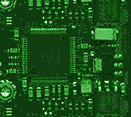Random access memory (usually known by its acronym, RAM) is a type of computer data storage. It today takes the form of integrated circuits that allow the stored data to be accessed in any order, i.e. at random. The word random thus refers to the fact that any piece of data can be returned in a constant time, regardless of its physical location and whether or not it is related to the previous
piece of data.[1]
This contrasts with storage mechanisms such as tapes, magnetic discs and optical discs, which rely on the physical movement of the recording medium or a reading head. In these
devices, the movement takes longer than the data transfer, and the retrieval time varies depending on the physical location
of the next item.
The word RAM is mostly associated with volatile types of memory, where the information is lost when power is switched off. However, many
other types of memory are RAM as well (i.e. Random Access Memory), including most types of ROM and a kind of flash memory called NOR-Flash.




